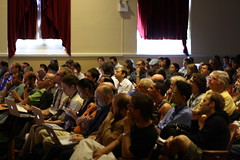Help us protect the commons. Make a tax deductible gift to fund our work. Donate today!
We wanted to give big thanks to Ben, Dean, Elizabeth, Adi, and all the volunteers to helped make the fantastic Open Video Conference happen. Myself, Jane and Alex K were all in attendance on behalf of CC and we figured we’d post a wrap up about our experience at the conference.
At the CC Salon NYC / OVC Pre-party, I was able to record my conversation with Brett Gaylor, the director and creator of RiP! A Remix Manifesto which also screened at OVC. You can download our interview in ogg here, or mp3 here, available under a our Attribution license. Fans of Adam McHeffey will be happy to watch a YouTube video of his performance here. And last but not least, thanks to Erik Möller from the Wikimedia Foundation for guiding us through Wikipedia’s switch to CC-BY-SA.
And of course, we couldn’t forget about Blip.tv for supplying the beer at the salon, For Your Imagination Studios for the space, and Parker and Wesley for helping out with setup and breakdown. We couldn’t have done it without you guys!
As for the OVC itself, we were blown away with the focus and intensity in every panel and session. I repeatedly heard from attendees how nice it was to have 100% of a conference focused on an issue that typically receives only 10% of the attention. One of my favorite presentations was by Chris Blizzard from Mozilla showing of Firefox’s 3.5 Ogg Theora capabilities. Here’s a quick screen cast some of the capabilities Chris showed off at the conference:
On Saturday afternoon I gave a well packed luncheon presentation on Open Video, Metadata, and Creative Commons. You can download the slides from my presentation here.
Here’s a brief summary from Jane and Alex who attended on behalf of ccLearn:
ccLearn also attended the first ever Open Video Conference and had a blast. We think much of the OVC’s success is due to the fact that so much of it was relevant to openness in general that education naturally fit the bill. “Open Video in Education” especially blew us away by the diversity of forward thinking present in the room by both open education advocates and those with little to no experience with open educational resources (OER). Most everyone in the room, including the audience, were in agreement that open video and open technologies are essential to the future of education. The expressed concerns were more about how to convince the higher-ups at their institutions to see the light.
To reiterate, the session was not lacking in representation. Someone remarked how the variety of perspectives yielded a kind of “transformer panel.” From Bjoern Hassler (Cambridge University’s Centre for Applied Research in Educational Technologies) who set the tone in the beginning by assuming that it is (or should be) apparent to everyone that CC BY is the best license for OER, Tiffiny Cheng (Participatory Culture Foundation) who highlighted Miro, the open source free high definition video player, to UC Berkeley’s webcast.berkeley, the panel was diverse but consistent in their view that open video for education is essential, that CC licenses for that video is a given, and that—to quote an audience member’s words—“You have to do more than just tape lectures.”
Finally, you can also watch most of the main hall sessions on the Livestream feed page for the OVC, though Flash is required. We’re assured these will be available in Theora in short order.
Great job OVC, we’re looking forward to the next one!
Posted 23 June 2009
